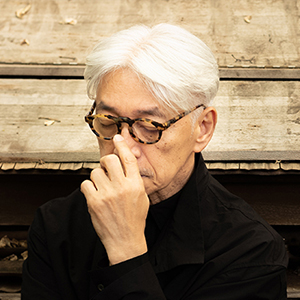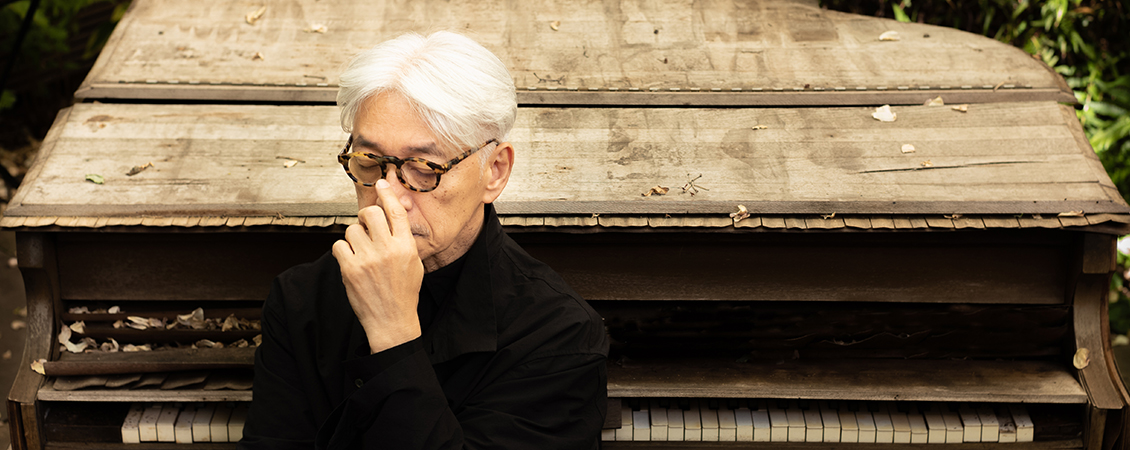Sakamoto Blue Sky
A virtual performance series in tribute to Ryuichi Sakamoto (1952-2023)
Sakamoto Blue Sky is a series of short online performances created in tribute to renowned composer, producer, artist, and environmental activist Ryuichi Sakamoto by artists who worked with, knew, or were deeply influenced by him. Works will be unveiled starting Saturday, August 26, the fortieth anniversary of the U.S. film release of Merry Christmas, Mr. Lawrence, the first film scored by Sakamoto’s.
The remaining works will by posted weekly starting on Thursday, August 31. The title of this project refers to 美貌の青空 Bibo no Aozora (“beautiful blue sky”), one of Sakamoto’s most widely beloved compositions, which he played throughout his career with a variety of musicians from different cultures and was most famously used in the feature film Babel (Iñárritu, 2006). We hope for the multitude of expressions in this project to come together as a kind of beautiful blue sky filled with Sakamoto’s spirit and to serve as resources to build community around Sakamoto's legacy.
The Artists and Works
Music and lyrics by Sirintip
Performed by Sirintip and Kengchakaj
Recorded by Nolan Byrd
Mixed and Mastered by Nolan Byrd
Filmed by Brandon Batson
Edited by Brandon Batson
Filmed at Christ Church NYC
“memories” is a song composed by Sirintip in honor of Ryuichi Sakamoto. When diving into Sakamoto’s extensive and diverse catalog, Sirintip explored a few ways of interpreting his music by looking at nuclear data, exploring synthesizers, and more. But what really stood out to Sirintip was the deep introspective emotions she felt when listening to his pieces "Bibo no Aozora,” “glacier,”, “solari,” and “energy flow.” These pieces made her reflect about life and death, and the devastating state of our environment, which Sakamoto was also concerned about. This led to the composition “memories,” which she composed from an introspective and emotional place of a storyteller in the distant post-apocalyptic future whose job it is to tell tales of a once beautiful and prosperous earth. But since so much time has passed, the storyteller is questioning their knowledge and if they ever experienced these times or if they’re just dreams. Acknowledging Sakamoto’s appreciation for quotes from the movie “The Sheltering Sky,” the song ends with “have we watched the last full moon rise?” questioning if humanity will ever witness this beautiful earth again.
Multimodal Thai-Swedish artist Sirintip draws inspiration from a range of styles and disciplines: jazz, pop, Thai traditional music, European classical, and more. Her works explore unsung intersections of humankind and the natural world — a focus that drives her curiosity and expands her output. Part ethereal, part impassioned, her vocals move nimbly across sophisticated harmony, soar over dense walls of sound, and pulse through rhythmic modulations. A highly sought studio collaborator, Sirintip has shared her unique sound on more than thirty releases.
As a singer, songwriter and producer, Sirintip has released multiple critically acclaimed leader recordings, including Carbon (Ropeadope 2022), The Lost World (GroundUP Music, 2022) and Tribus (GroundUP, 2018); collaborated on diverse projects, including albums from Bill Laurance of Snarky Puppy, Evan Marien, Sasha Berliner, Kengchakaj Kengkarnka, and The Fur; and produced releases for actor Melanie Smith (Seinfeld), Vincent Ding and FORQ. Her work as a performing artist engages different modalities, including upcoming large-scale installation and VR, among other mediums. Sirintip’s voracious curiosity and high-level musicianship have garnered international grants, awards, and recognition from such distinguished outlets and institutions as New York Foundation for the Arts, the Lower Manhattan Cultural Council, Sitka Center of Ecology & Art (Artist at Sea Residency), Swedish Performing Rights Society, and The Royal Academy of Music (Stockholm), among countless other distinctive honors.
Made possible with support from the Fiscal Year 2021 Japanese American Confinement Sites Grant Program, National Park Service.
Sound: Birdsong
Videography by Ashley Brunning, recorded July 1, 2023
Molissa Fenley was born in Nevada in 1954, grew up in Ibadan and Lagos, Nigeria, and returned to the USA to attend Mills College. She moved to New York in 1975 and founded Molissa Fenley and Company in 1977. The company has performed throughout the United States, Canada, Mexico, South America, Europe, Australia, India, Indonesia, Japan, Korea, Singapore, Taiwan and Hong Kong. Choreographic commissions include the American Dance Festival, the Brooklyn Academy of Music, the Dia Art Foundation, Jacob’s Pillow, The Joyce Theater, Lincoln Center, New National Theater of Tokyo, National Institute of Performing Arts, Seoul, New York Live Arts, Australian Dance Theatre, Deutsche Oper Berlin, Bill T. Jones/Arnie Zane, Richard Move, Oakland Ballet, Ohio Ballet, Pacific Northwest Ballet, and many others.
Molissa has received fellowships and residencies from American Academy in Rome, American Masterpieces of the National Endowment for the Arts, Asian Cultural Council, Atlantic Center for the Arts, Bogliasco Foundation, Foundation for Contemporary Arts, Guggenheim, National Endowment for the Arts, Bard College, Baryshnikov Arts Center, Bloedel Reserve, Dance HUB Florence/Agropoli, Harvard University, Yaddo, and others. She is three-time Bessie Award winner in choreography for Cenotaph (1985), State of Darkness (1988), and (for outstanding revival) State of Darkness (2021). Molissa was on faculty at Mills College in 1999-2020, now professor emerita. Her work was highlighted in the book monograph, Rhythm Field: The Dance of Molissa Fenley (Seagull Press/University of Chicago, 2015). Currently, the Molissa Fenley Archive is en route to the Jerome Robbins Dance Division of the New York Public Library for the Performing Arts at Lincoln Center.
Lyrics are from the track called “Tetsudo-in” (鉄道員), voice is Taeko Ohnuki.
Carl Stone is one of the pioneers of live computer music and has been hailed by The Village Voice as “the king of sampling” and “one of the best composers living in [the United States] today.” He has used computers in live performance since 1986. Stone studied composition at the California Institute of the Arts and has composed electro-acoustic music almost exclusively since 1972. His works have been performed in the United States, Canada, Europe, Asia, Australia, South America and the Near East. In 2001 he joined the faculty of Chukyo University’s School of Cognitive and Computer Sciences in Japan.
A winner of numerous awards for his compositions, including the Freeman Award for the work Hop Ken, Stone is also the recipient of grants from the National Endowment for the Arts, the Rockefeller Foundation and the Foundation for Performance Arts. His three-LP release “Electronic Music from the Seventies and Eighties” on the Unseen Worlds label was #1 in The Wire Magazine’s “Best of 100” 2016 archival category. Stone’s music has been used by numerous theater directors and choreographers worldwide including Hiroshi Koike, Akira Kasai, Bill T. Jones, Setsuko Yamada, Ping Chong, June Watanabe, Kuniko Kisanuki, Rudy Perez, Hae Kyung Lee, and Blondell Cummings. Musical collaborations include those with Akaihirume, Michiko Akao, Pearl Alexander, Samm Bennett, Sarah Cahill, Gianni Gebbia, Mineko Grimmer, David Grubbs, Haco, Alfred Harth, Madoka Kono, Gil Kuno, Min Xiao-Fen, Otomo Yoshihide, SAEBORG, Kazue Sawai, Elliot Sharp, Yasuaki Shimizu, Stelarc, Aki Takahashi, Yuji Takahashi, Tosha Meisho, Kazuhisa Uchihashi, Wu Na, Wu Wei, Michiyo Yagi, Ami Yamasaki, Miki Yui, and z’ev.
Stone served as president of the American Music Center from 1992-95. He was the director of Meet the Composer/California from 1981-1997, and music director of KPFK-fm in Los Angeles from 1978-1981. Further activities have included serving as a regular columnist for Sound & Recording Magazine in Japan, serving as web editor for Other Minds, and for the official web site of the John Cage Trust. Recordings of Stone’s music has been released on New Albion, CBS Sony, Toshiba-EMI, EAM Discs, Wizard Records, Trigram, t:me recordings, New Tone/Robi Droli, Unseen World, and various other labels.
One of my favorite poems that embodies and synthesized these traditions is from Zen master Ichikyo Kozan. Legend has it that he passed away after putting down the brush he painted his poem with. He sat upright, uttered the poem, and consciousness passed from his body. The poem goes as follows.
Empty handed I entered the world
Barefoot I leave it.
My coming, my going -
Two simple happenings
That got entangled…
Written in 1360, that poem could be one of the best visions of how we look at the complexity of the universe that surrounds us.
I met Sakamoto-San at the beginning of my career. As a young African American musician and composer, I was more familiar with his work through Yellow Magic Orchestra, the band that spearheaded the rise of electronic music in Japan, and set the tone for so many styles of music that we listen to today. They, like Kraftwerk, like Afrika Bambaata, and so many legends from the later half of the twentieth century, created a legacy that Sakamoto-san built in and expanded. As a composer there were no boundaries. You can see his influence in so many musicians and artists in the twenty-first century. We met at his space in the West Village off of the Village Vanguard or the Whitney Museum, or Smorgas, the Swedish restaurant he would occasionally eat at with friends. When you get asked by such a legendary figure to participate in an album called The Dischord Symphony, you have to wonder what will come of it all. He had asked to have me DJ with the symphony, and projected Laurie Anderson reading poems throughout the compositions. There’s a generosity at work. There’s a cross cultural curiosity at work. Sakamoto-san embedded this kind of will to break down the silos between cultures, worlds, and the universe that sometimes seems to be so distant from all the human senses that we use to navigate the complex relationships that make our existence on this planet sometimes make sense. Sakamoto-san made music about tree roots. He made music about contemplation. He made music for film. He made music about art, science, and so many other topics that drove his relentless curiosity. We are all so fortunate to have had such a prodigy in our lifetime. Today a VR installation of Sakamoto-san plays at an art space in NYC. The term kagami in Japanese simply means mirror, and it is fitting that his work from so many genres are presented in a mixed reality approach. As he said towards the end of his struggle with cancer:
There is, in reality, a virtual me.
This virtual me will not age, and will continue to play the piano for years, decades, centuries.
Will there be humans then?
Will the squids that will conquer the earth after humanity listen to me?
What will pianos be to them?
What about music?
Will there be empathy there?
Empathy that spans hundreds of thousands of years.
Ah, but the batteries won’t last that long.
—Ryuichi Sakamoto, 2023
Sakamoto-san, rest in power. You will be missed, but never forgotten.
Paul D. Miller aka DJ Spooky
Livingston Manor 2023
Paul D. Miller, aka DJ Spooky, is currently artist in residence at Yale University Center for Collaborative Arts and Media (2023-2024, extended). He is a composer, multimedia artist, and writer whose work engages audiences in a blend of genres, global culture, and environmental and social issues. Miller has collaborated with an array of recording artists, including Ryuichi Sakamoto, Metallica, Chuck D from Public Enemy, Steve Reich, and Yoko Ono. His 2018 album, DJ Spooky Presents: Phantom Dancehall, debuted at number three on Billboard reggae.
Miller’s large-scale, multimedia performance pieces include Rebirth of a Nation, Terra Nova: Sinfonia Antarctica, commissioned by the Brooklyn Academy of Music, and Seoul Counterpoint, written during his 2014 residency at Seoul Institute of the Arts. His multimedia project Sonic Web premiered at San Francisco’s Internet Archive in 2019. He was the inaugural artist-in-residency at the Metropolitan Museum of Art’s The Met Reframed, 2012-2013.
In 2014, Miller was named National Geographic Emerging Explorer. He produced Pioneers of African American Cinema, a collection of the earliest films made by African American directors, released in 2015. Miller’s artwork has appeared in the Whitney Biennial, The Venice Biennial for Architecture, the Miami/Art Basel fair, and many other museums and galleries.
Miller’s books include the award-winning Rhythm Science, published by MIT Press in 2004; Sound Unbound, an anthology about digital music and media; The Book of Ice, a visual and acoustic portrait of the antarctic; and The Imaginary App, on how apps changed the world. His writing has been published by The Village Voice, The Source, and Artforum, and he was the first founding executive editor of Origin Magazine.
Ryuichi Sakamoto Bio
Ryuichi Sakamoto lived many musical lives in his nearly 71 years. As a keyboardist and songwriter in Haruomi Hosono’s Yellow Magic Orchestra, he helped set the stage for synthpop. His solo experiments in fusing global genres and close studies of classical impressionism led to him scoring over 30 films in as many years, including Nagisa Oshima’s Merry Christmas. Mr. Lawrence, Bernardo Bertolucci’s The Last Emperor and The Sherltering Sky, and Alejandro González Iñárritu’s The Revenant. In the past 20 years alone, he’s written a multimedia opera, turned a glass building into an instrument, and travelled to the Arctic to record the sound of melting snow. That exploratory spirit runs through Sakamoto’s 2017 album, async, which paints an audio portrait of the passing of time informed by his recovery from throat cancer. “Music, work, and life all have a beginning and an ending,” Sakamoto said in early 2019. “What I want to make now is music freed from the constraints of time.”Thank you to our season sponsors:









